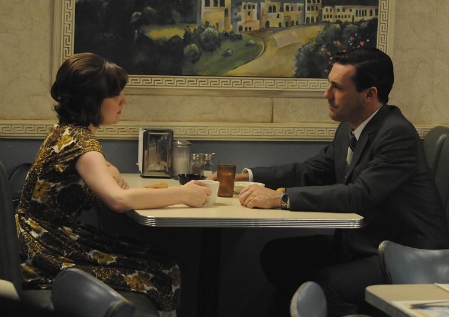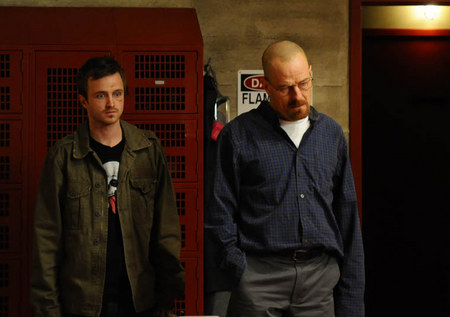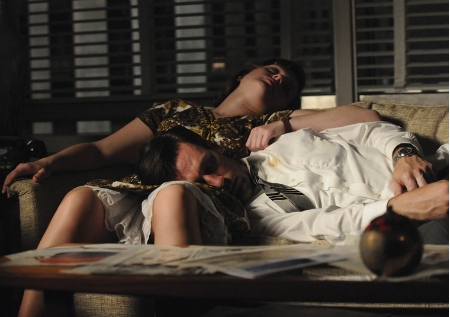|
Peggy and Don in "The Suitcase." (Michael Yarish/AMC) _ There are so many great TV shows right now. I recently watched all of Mad Men and then all of Breaking Bad—if you haven’t seen them, this won’t make much sense, but if you have, then maybe you are just as excited as I am. I remember when I didn't watch TV for 7 years because it wasn't worth it—I think the only show I watched was The Sopranos. Maybe I just wasn’t looking in the right places. The parameters these TV shows have to work around (trying to film them like movies but with time, budget and FCC constraints), in some cases (Breaking Bad, Mad Men, pretty much all of HBO), actually make them more creative and focused on character and plot and have real depth because they utilize these constraints to their advantage and turn inward to examine the world within the characters' relationships with each other. Each episode becomes a mini movie, except the really exciting thing is that your relationship with the characters doesn't have to end, for 5, 6, maybe 7 years in some cases. I just watched an episode of Breaking Bad called "The Fly" which was very similar to an episode of Mad Men called "The Suitcase." Both have two characters who share scenes of tension and then incredible camaraderie, either because of mutual admiration, sharing personal history together or living in an ‘alternate’ life that can only be shared with this other person, usually because of circumstance (Don Draper and Peggy Olson in Mad Men or Walt and Jesse in Breaking Bad). Both of these episodes explore the profound psychological aspects of their relationships in the confinement of a small space (The meth lab or Don's office) while focusing on a singular task. In Breaking Bad, the entire plot is (within this one particular episode) Walt and Jesse trying to kill a fly. In Mad Men, Don and Peggy try to come up with an ad for a suitcase. Then layered on top of this singular task is a complex web of power struggles and emotional bonding, intimacy between them and ultimately between the characters and the viewer as we learn more about what makes them tick. Jesse and Walt in "The Fly." (www.moviewebb.com) Walt and Don are the ones in charge, yet each shows their emotional vulnerability which then allows the secondary characters to take control, even if just briefly, because they choose to stay with their superiors during their time of weakness. Peggy stays with Don even when she's supposed to meet her boyfriend for dinner on her birthday and when her older lover comes into the office drunk and gets into a fight with Don. EVEN after Don makes her cry in the bathroom, she stays with him when he is wasted and puking and she's there when he finds out a close friend has died and cries in her arms. In Breaking Bad, Walt is obsessed with finding this fly to a point of hysteria, refusing to cook the meth and locking Jesse out of the lab, yet Jesse doesn't give up on Walt. At first we can assume it’s because of money, the same way we can assume Peggy stays because she doesn’t want to lose her job or miss an opportunity for more recognition. Jesse buys tools to help catch the fly, drugs Walt to get him to sleep so he can start making the meth (which has a deadline), and even tries to catch the fly by precariously putting a ladder on two unstable tables until Walt falls asleep and Jesse makes all the meth himself. Interesting that both Peggy and Jesse help Don and Walt to bed, it really emphasizes their character’s roles as “supporting”. The story brings the two characters together, feeling empathy for each other, and then tears them apart again with dramatic tension and conflict. It must be an actor’s dream to be in scenes like these. At the end of both episodes you think some of the conflict has been resolved—Jesse tucks in Walt after he falls asleep and Don gently puts his hand on Peggy’s hand the next morning in his office to show his gratitude and his feelings for her after they fell asleep on his office couch together. In classic ego-driven alpha character style, Walt reminds Jesse the next day that some meth is missing and insinuates that Jesse must be stealing it (which he is) instead of thanking him or acknowledging his help which Jesse so desperately wants and needs from somebody, especially Walt. The episode ends with tension between them again. In Mad Men, not long after the gentle hand touch in Don’s office, he announces he’s getting married to his secretary—a woman he barely knows. Peggy is outraged because she thought maybe Don had possible feelings for her and because she tried to get him to make the right decisions. She’s become Don’s protege and she seeks his approval. Walt and Don need to regain their protagonist status after revealing a more fragile side, and Jesse and Peggy reveal they are stronger than what we thought. The show makes you side with one and then the other and then when you realize they can’t truly function without each other, the writers present obstacles that keep them apart. This is when I love writing, actors and film/television production. I read a review once of The Dark Knight, that talked about the importance of ending the movie with Batman as not a hero but a vigilante on the run. We're not left completely satisfied and there's a transformation in that aching and desire to have resolution for the story and the characters. Leaving us longing for Walt and Jesse to stay together in their crumbling world of drug manufacturing and distribution and our desire to see Don and Peggy maintain that intimacy where Don can actually be real and honest and Peggy can be strong and respected, keeps us coming back each week, or in my case, hitting the "Play Next Episode" on Netflix so we can see out their relationships. Both "The Fly" and "The Suitcase" episodes go back to the fundamentals of storytelling—it’s not about Walt’s life of crime with explosions and murder and DEA agents or Don’s tangled web of lies and escapades with all the women in 1960s New York City. It’s about two people, in a room, trying to solve a problem and by focusing their energy towards this one, simple task, we get to learn more about their individual stories and how much they need each other, for better or worse. At the end of a long night (Michael Yarish/AMC) Even the people who make Breaking Bad think it will be your favorite episode! |
Archives
May 2023
Categories
All
|



 RSS Feed
RSS Feed